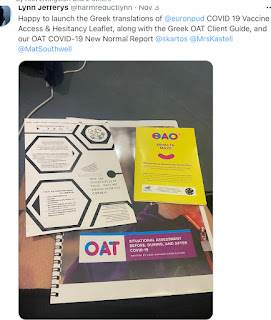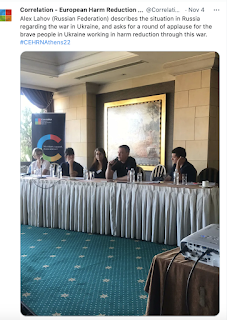Correlation European Harm Reduction Network
https://www.correlation-net.org
#cehrnathens22
Harm Reduction in Athens – With the Eye of an Outsider
Seven years after our last visit, we returned to Athens to film about harm reduction in Greece, with a special focus on the first drug consumption room. Read our article and watch the movie we produced!
When I arrived in Athens to attend the annual members’ meeting of the Correlation European Harm Reduction Network (C-EHRN), memories were flooding back from my previous visit to Athens. In 2015 made a film in the Greek capital about the first supervised injecting site, Odysseas, which was opened in 2013 to provide a safer and healthier environment for people who inject drugs.
Watch our new movie about harm reduction in Greece! Thanks to C-EHRN for supporting our work!
https://www.youtube.com/watch?v=bZDhlwZoKqg&list=LL&index=5
Back in those days the situation was quite different. The site was suspended after a few months of operation due to “legal problems” – which really translated to a lack of political support. We were not even allowed to enter the closed site and there were obvious signs of distrust between decision makers and civil society.
This time, seven years later, I was pleasantly surprised by what I have experienced in Athens. Not that the situation on the streets looks better: wherever you go in the city centre, you see homeless people, living in poverty, trying to ease the suffering of their everyday struggle for survival on the streets with different kinds of substances. There are open drug scenes with shocking sights of abandoned, marginalised people. The consequences of decades of austerity politics will not disappear anytime soon.
However, meeting with local officials and civil society representatives was uplifting. It seems that the current political leadership, both in the city and the national level, is more competent and committed than it was seven years ago. And the COVID epidemic, with all its devastating effects, had its upsides as well: it provided an opportunity to revise some outdated policies and bring some innovation into the drug care system.
The drug consumption room (DCR) is now open and working, serving the most marginalised people by creating an island of security, health, and humanity in the often hostile jungle of urban street life. We could visit and film the site. I have been to many similar sites from Canada to Germany – but this was not only the easternmost of those, it was also one of the best equipped.
The whole DCR had the impression that everything is brand new. Clients can use both the injection room and a smoking room – a welcome choice considering that apart from heroin users, Athens has a growing population of methamphetamine users (the locals call it shisha). There are comfortable chill-out rooms, cosy spaces for people to eat and wash themselves and their clothes. Some of the rules seemed too rigid: for example opioid agonist therapy (OAT) clients cannot use the site due to some bureaucratic nonsense. Well, nothing is perfect – but it is a very promising start!
What is more, not far from the DCR, there is a shelter for people who use drugs – a six-story building with showers, dining rooms, meeting rooms, and separate sleeping quarters for male and female drug users (max. 90 persons), as well as a unit for women with kids. Loss of housing is always one of the key underlying social problems that fuels and escalates drug dependence, overdoses, and infections. By giving people a place to sleep we do as much harm reduction as with giving out sterile needles. Athens mayor, Kostas Bakoyannis, who personally opened the C-EHRN meeting, said scaling up access to harm reduction in the city is one of the main achievements he can be proud of.
The Greek drug system is based on a unique model with OKANA, a state-funded organisation, as the largest service provider in the country. OKANA provides the whole spectrum of care, from prevention to treatment, harm reduction, and social rehabilitation. This integrated model has its obvious benefits. For example, for clients it is easier to navigate through the system and be referred to the service they need. Athanasios Theocharis, the head of OKANA, was proud to report that they significantly increased the number of clean syringes distributed and improved access to OAT. He is a committed and competent public official who has a vision to involve the most affected communities in implementing and monitoring interventions.
Of course the community itself has a lot of complaints and criticisms when it comes to the actual situation. Luckily Greece has a vibrant community with excellent activists, such as Marios Atzemis, Christos Anastasiou, and Daphne Cronopoulou. They say the high number of overdose deaths is concerning, access to naloxone is limited and one DCR is far from enough to serve the whole population who need harm reduction (OKANA is planning to create new mobile services in the near future). They experience a lot of stigma and discrimination, not only from the general public, but also from health and social professionals. Who often still have a paternalistic approach when it comes to people who use drugs: they don’t treat them as equal citizens but as problems to be fixed.
And of course there is the notoriously brutal Greek police. There are reports of beatings and torture of people who use drugs. They demand decriminalisation. Mr. Theocharis agrees: he claimed that they have initiated a dialogue about decriminalisation with the Ministry of Justice.
I came back from Athens with the firm impression that change is possible – what is needed is the powerful mix of competent officials, a strong civil society/community, and decision makers who listen to both and are ready to provide sustainable funding.
Article: Péter Sárosi
Camera: Noémi Hatala
Editing: István Gábor Takács
Reporter: Péter Sárosi





































































